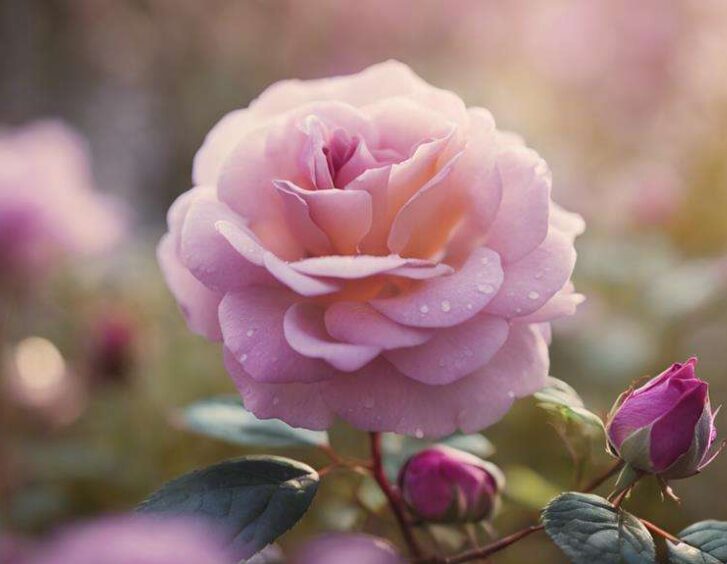Ready to dive into the wonderful world of Reine Des Violettes roses? These beautiful flowers are famous for their stunning mauve-to-magenta blooms and captivating fragrance.
To kick things off, find a spot that gets morning sun but also offers some shade in the afternoon. Remember to give your roses a good drink of one gallon of water per week to keep them happy and thriving. It's essential to plant them in well-draining soil with the right pH balance to ensure they have a solid foundation for growth.
When it comes to helping your roses flourish, understanding the best practices for propagation, pruning, and fertilization is key. By mastering these techniques, you'll set the stage for healthy growth and abundant blooming.
As you dig deeper into the world of Reine Des Violettes roses, you'll uncover expert tips and tricks that will elevate your rose-growing game to new heights.
So, roll up your sleeves and get ready to nurture these enchanting beauties into full bloom!
Key Takeaways
• Plant Reine Des Violettes roses in well-draining soil with a pH between 6.0 and 7.0, rich in organic matter.
• Provide morning sun and afternoon shade, and water regularly with at least one gallon per week.
• Use cutting propagation methods, taking cuttings in June or July, and prune during the dormant season to promote healthy growth.
• Fertilize with slow-release fertilizers in spring, and liquid fertilizers throughout the season, avoiding over-fertilization after mid-August.
• Mulch to regulate soil temperature, and remove damaged or diseased wood to ensure thriving growth and blooming.
Overview of Reine Des Violettes
With its delicate, violet-hued blooms and intoxicating fragrance, Reine des Violettes roses have captivated rose enthusiasts since their introduction in France in 1860.
You'll fall in love with the elegant, mauve-to-magenta blooms that repeat over the season, filling the air with their sweet scent. This perennial hybrid perpetual rose boasts a graceful bush with smooth green leaves and thornless branches.
As one of the bluest roses ever raised, Reine des Violettes is a standout in any garden. With its fragrant blooms and charming appearance, it's no wonder this heritage rose has remained a favorite among rose enthusiasts for centuries.
Whether you're a seasoned gardener or just starting out, Reine des Violettes is sure to delight.
Planting and Growing Conditions
To successfully cultivate Reine des Violettes roses, you'll need to provide them with the right environment. Start by purchasing from specialty nurseries online since heirloom roses are rarely found in big box stores.
For best growth, plant them in a spot with morning sun and afternoon shade, ensuring at least six hours of sunlight exposure. Water your roses regularly, aiming for about one gallon of water per week, and consider container gardening if you have limited space.
When using pots, choose a well-draining mix and follow proper potting techniques. By providing the right conditions, you'll be rewarded with beautiful, fragrant blooms that will thrive under your care.
Soil and Temperature Requirements
You'll need to provide your Reine des Violettes roses with well-draining soil that has a pH between 6.0 and 7.0, rich in organic matter, to guarantee they thrive. This secures your roses receive the necessary nutrients for healthy growth and blooming.
Here are some key factors to take into account when it comes to soil composition and climate considerations:
- Choose a location with full sun to partial shade, depending on your climate.
- Make sure your soil has good drainage to prevent waterlogged soil.
- Add organic matter like compost or manure to improve soil fertility.
- Avoid planting in areas with standing water or where water tends to collect.
- Consider using mulch to regulate soil temperature and retain moisture.
Propagation and Pruning Techniques
By mastering the art of propagation and pruning, you can successfully multiply and shape your Reine des Violettes roses to achieve a stunning display of fragrant, violet-hued blooms. To propagate, you can use cutting propagation methods, such as semi-hardwood and hardwood cuttings. Take cuttings in June or July, ensuring each has at least three to five buds.
Prune your roses during the dormant season, removing damaged or diseased wood and thinning out canes. Prune once-bloomers after flowering and repeat-bloomers during the dormant season. This will promote healthy growth and encourage blooming. Effective pruning methods, combined with proper growth techniques and maintenance practices, will help you achieve a beautiful, thriving rose garden.
Watering and Fertilization Schedule
When caring for your Reine des Violettes roses, establishing a consistent watering and fertilization schedule is essential for promoting healthy growth and encouraging blooming.
Here are some essential tips to keep in mind:
- Water your roses at least once a week, aiming for about one gallon of water per week, especially during summer hydration.
- Maintain a nutrient balance by applying slow-release fertilizers in early spring and liquid fertilizers throughout the season.
- Prioritize seasonal feeding, focusing on root health and nutrient uptake during key growth stages.
- Avoid over-fertilizing, especially after mid-August, to prevent excessive growth that can weaken your roses.
- Monitor temperature and adjust your watering schedule accordingly, ensuring your roses receive adequate hydration without waterlogged soil.
Mulching and Winter Protection
For your Reine des Violettes roses to prosper, apply a two to three-inch layer of mulch in early spring, which helps conserve water, cool the roots, and suppress weeds. Mulching benefits extend to frost protection, ensuring your roses survive harsh winters.
As you prepare for winter, remember to provide additional care to safeguard your roses from freezing temperatures. In Zones 4-5, provide winter protection by adding an extra layer of mulch or straw to shield the base of your plants.
Regular garden maintenance, including mulching and winter care, is vital for the health and longevity of your Reine des Violettes roses. By following these simple yet essential steps, you'll be well on your way to becoming a master rose gardener.
Deadheading and Pruning Tips
As you've mulched and protected your Reine des Violettes roses for the winter, now it's time to focus on deadheading and pruning to encourage healthy growth and blooming.
Here are some essential tips to keep in mind:
- Use sharp, clean pruning tools to prevent damage and disease transmission.
- Deadhead after each bloom cycle to encourage repeat blooming and maintain plant health.
- Prune during the dormant season to promote healthy growth and prevent disease.
- Cut back canes by one-third to encourage bushy growth and more blooms.
- Remove damaged or diseased wood to prevent the spread of disease.
Shaping and Training Methods
To create a stunning display of Reine des Violettes roses, you can employ various shaping and training methods that will enhance the beauty of your blooms and encourage healthy growth. By using training techniques, you can increase the aesthetic appeal of your roses and create a breathtaking visual display.
Shaping methods, such as pegging and training as climbers, can also promote bloom abundance and encourage your roses to thrive. By carefully guiding the growth of your roses, you can create a stunning display of mauve-hued blooms that will be the envy of all who see them.
With a little patience and practice, you can master the art of shaping and training your Reine des Violettes roses, and enjoy a bounty of beautiful blooms all season long.
Common Care and Maintenance
You'll want to establish a regular routine for inspecting your Reine des Violettes roses to catch any potential issues before they become major problems. Regular checks will help prevent pest infestations and diseases from taking hold.
Here are some essential care tips to keep in mind:
- Inspect your roses regularly for signs of pests or disease.
- Provide support for tall stems to prevent damage from summer blooming.
- Remove weeds that compete with your roses for water and nutrients.
- Mulch around the base to retain moisture and suppress weeds.
- Water deeply once or twice a week, depending on weather conditions.
Fertilization and Soil Management
Your Reine des Violettes rose blooms its best when fed a balanced diet of nutrients, and that starts with the right fertilization schedule and soil management.
You want to guarantee your rose absorbs the right nutrients for peak growth and blooming. A well-balanced fertilizer with a mix of nitrogen, phosphorus, and potassium promotes healthy growth and flower production.
Soil health is also essential, so make sure your soil has good drainage and is rich in organic matter. This will help your rose's roots absorb nutrients efficiently.
Regularly test your soil's pH levels and adjust accordingly. By providing your Reine des Violettes rose with the right nutrients and soil conditions, you'll be rewarded with vibrant, fragrant blooms all season long.
Frequently Asked Questions
Can Reine Des Violettes Roses Be Grown in Containers?
You can grow Reine des Violettes roses in containers!
Start by choosing a container that's at least 12-18 inches deep and 2-3 times as wide as the root ball.
Prepare the soil by mixing in organic matter and ensuring good drainage. Use a high-quality potting mix specifically designed for roses.
Make sure the container has drainage holes to prevent waterlogged soil.
With proper care, your Reine des Violettes rose will thrive in its new container home.
How Often Should I Inspect My Roses for Pests and Diseases?
You should inspect your roses regularly for pests and diseases to prevent infestations and infections. Check your plants at least once a week, looking for signs of trouble like holes in leaves, white powdery residue, or black spots.
Good garden hygiene is key - remove any infected plants or debris to prevent the spread of disease. Keep an eye out for pest patterns, like aphids clustering on stems or whiteflies hovering around blooms.
Are Reine Des Violettes Roses Suitable for Small Gardens or Balconies?
You're wondering if Reine des Violettes roses are suitable for small gardens or balconies. The answer is yes! While they can grow tall, compact varieties and vertical gardening techniques can help overcome space constraints.
In urban landscaping, consider patio design that incorporates trellises or obelisks to support climbing roses. With proper care, these roses can thrive in small spaces, providing beautiful blooms and a sense of serenity in even the smallest of gardens.
Can I Grow Reine Des Violettes Roses From Seed?
You're wondering if you can grow Reine des Violettes roses from seed.
The answer is yes, but it's not the most recommended approach. Reine des Violettes is a hybrid rose, and seed germination may not produce identical roses. Rose hybrids, like Reine des Violettes, are often propagated through cuttings to guarantee consistent traits.
However, if you still want to try seed germination, make sure to use fresh seeds, provide ideal growing conditions, and be patient – it may take several months for seeds to sprout.
Do Reine Des Violettes Roses Attract Bees and Other Pollinators?
You're wondering if Reine des Violettes roses attract bees and other pollinators. The answer is yes! These fragrant, mauve-hued blooms are a magnet for pollinators.
Bees, in particular, are drawn to the roses' sweet nectar and pollen. The diversity of pollinators visiting your Reine des Violettes roses can be impressive, including butterflies, hoverflies, and even hummingbirds.
















